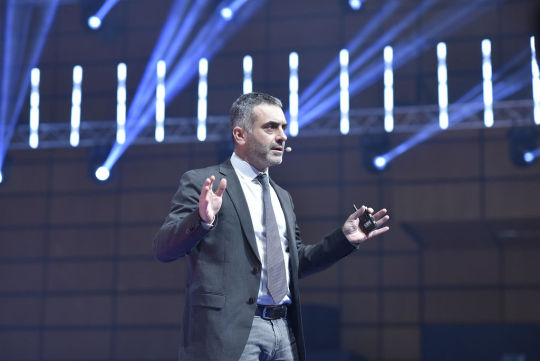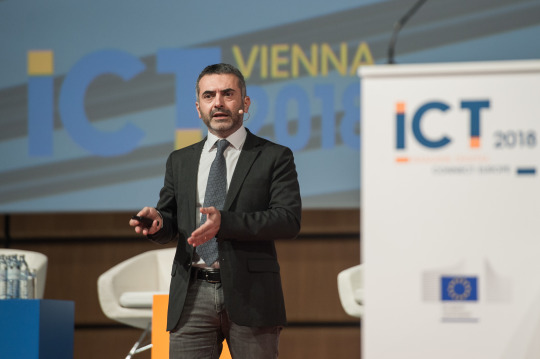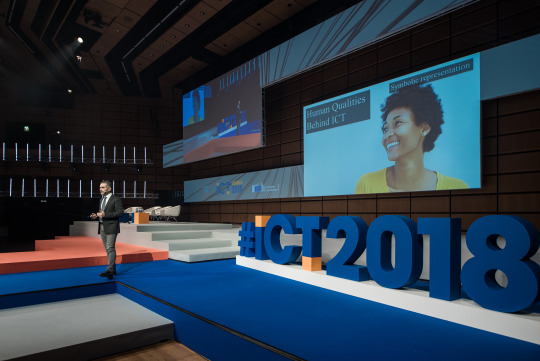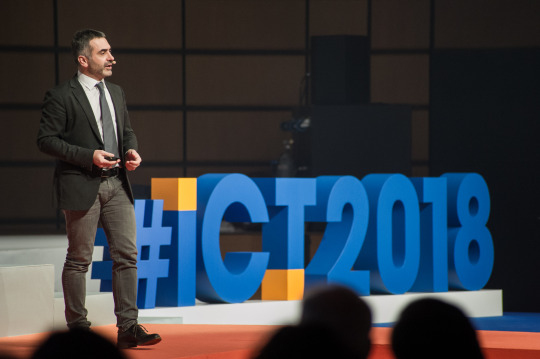The digital story of humanking
Publication date: January 14, 2019
This blog post is an authorized transcript of the speech that Alessandro Bogliolo gave on 6 December 2018 at ICT 2018 in Vienna. You can also watch the full video recording online.
All human beings are born free and equal in dignity and
rights. This is Article 1 of the Universal Declaration of Human Rights.
Everyone has the right to education. Article 26.
Everyone has the right freely to participate in the cultural
life of the community to enjoy the arts and to share in scientific advancement
and its benefits. Article 27.

In four days we are going to celebrate the 70th anniversary
of the Universal Declaration of Human Rights. This is more than enough as a
motivation for me to start with this slide. But right now I would like to zoom
in and to try to focus on the technology which made it possible in 1948 to
write such a declaration and to make it so strong to survive over time and to
preserve all the strength that these words are transmitting.
So let me take an alphabet, an extended one, that also has a
space and punctuation, and I’d like you to help me running a little experiment:
if you have notebook, pen, pencil and paper, please write the letters that I
mention. So I just take from the alphabet an A, then I take an L and an L
again, then I put a space. Please do it in a new line and write A, L, L, space.

Then I go ahead and take a H, U then M, A, N and
then another space here. Now which letter should I put here? Any suggestion? I
take a B, please write a B in your notes, then E, I, N, G, S.
So, look at what has happened: we have done something which
is so simple and mechanical as taking symbols from a finite alphabet and
putting them in sequence and we have made the first and most important words of
the Universal Declaration of Human Rights appear in the screen, and appear also
in your notes.
That’s like magic, because we have done just this, but these
words have the incredible power of surviving over time, they will last forever.
And they will last forever because if I switch the slides they are still in
your notes just because they can be dictated; and being dictated means that
propagating over time and space.

If we burn all your notebooks, then we can do a little
experiment again to really perceive the strength of these words, because if you
close your eyes what happens is that you can repeat with me “all human
beings”, please try to do so “all human beings”, without reading
the slide or your notes. This means that these words are still in your mind and
you can tell other people, so that they will really last forever.
This is what “digital” is all about, because
digital actually means represented as a sequence of symbols taken from a finite
set and these symbols could be letters, could be sounds, could be digits, or
could be bits, of course. And that’s why I can say that the digital age
actually began in prehistory, with the human capacity for symbolic
representation, which allowed humans to have a language and to communicate, to
tell stories, to have a history.
Because we wouldn’t have a history without the
capability of telling it, to have a culture, because we wouldn’t have a culture
without the capability of transmitting knowledge, and it is all about digital,
about symbolic representation.

Even
computation is based on that, because this is the Turing machine, and the
peculiar features of the Turing machine, which is the conceptual model all
computers are still based on, is the capability of reading and writing symbols
on a tape. The Turing machine wouldn’t be capable of processing information if
human beings were not capable of representing information as a sequence of
symbols.
So, basically, every age has its own digital technology. Digital
technologies are spoken languages, writing is a digital technology, typography
is a digital technology, but also telegraph was a digital technology, and now
we have ICT.
Stressing the fact that ICT is not the only digital
technology in hands, is not the first in history, is not meant to diminish it. On
the contrary it is meant to look back at all previous digital technologies to
see how important, how fundamental, how disruptive they have been for Humanity,
in order to fully understand how important ICT is right now.

And
ICT is not only digital, it is also programmable, at least since 1840, when
Charles Babbage conceived the analytical engine, a general-purpose computer,
and he realized that in order to make a computer truly general, the computer
needed a human being telling it what to do. This is where Ada Lovelace came
into the picture by programming this computer, making it able to really do
something useful, by implementing algorithms.
They basically introduced the dichotomy between hardware and
software that nowadays provides the fastest path to innovation that we have. It
is possible right now for us to make our ideas come true just by writing new
lines of code for the tens of billions of existing programmable objects that
are already in the pockets of every human being, almost.
But, basically, computer programming is a matter of
delegation, in the sense that what we have are ideal performers that are
computers and robots. They are called “ideal performers” because they
are stupid enough to do exactly what we tell them to do, and if we want to
delegate the accomplishment of a task to an ideal performer we need to fully
and deeply understand the algorithmic natural of that task.
Algorithms are probably the most solid basis that we have to
build our future, because they last forever.
Algorithms are among the highest achievements of human
intelligence and a problem for which we know an algorithmic solution is no
longer a problem, it is just a task to be accomplished.

Yesterday, Cecilia Bonefeld-Dahl said that she believes in
democracy true empowerment, so do I. And that’s why I feel that we have a moral
duty to promote research, development and exploitation of ICT.
We
need first of all to launch thorough literacy campaigns, not functional literacy,
but just literacy, because ICT is like a spoken language, it’s like writing and
reading, so it’s a fundamental skill. Then we need to provide free access to
education, also in name of the Universal Declaration of Human Rights, and we
need to provide equal opportunities to boys and girls to decide whether or not
to take studies and careers in ICT, overcoming all the stereotypes that may
rise barriers that add to the socio-economic and cultural barriers already in
place. And we need to include all human beings.
To do so, we have to empower people, we have to focus on
human qualities. Which human qualities? Not just technology proficiency, or
proficiency with technology, but those human qualities that are behind ICT,
those that are enabling the development of ICT: among others, for sure, the
capacity for symbolic representation and computational thinking.
But we have also to stress the fact that there are human
qualities that are above ICT, those are the human qualities that will never be
replaced by a machine, like, for sure, creativity, intelligence, empathy, free
will. Focusing on these is not obvious, it’s something that we have to
communicate, to make clear to people that they will never be left behind,
because technology needs them more than they need technology.
So I call all of you to keep using and developing ICT, being
aware that ICT is the digital technology of today, we have to use ICT to write
new pages of our history. And in order to be proud of these pages, that will
last forever thanks to their symbolic representation, we need to make sure that
every page of our history from now on will start with these three words
“all human beings…”.


